JupiterOne March 2023 Release
New Features and Improvements
-
Your J1 Insights dashboards are now equipped with pagination in the data-table. This change makes your dashboards load quicker and provides a uniform data-table experience throughout J1.
-
The expandable properties panel with the preset graph views is now available when inspecting entities in the graph canvas.
-
All your csv exports links are now sent to the notification panel, which will allow you to move throughout your J1 workflows and get notified when your csv is ready to be download.
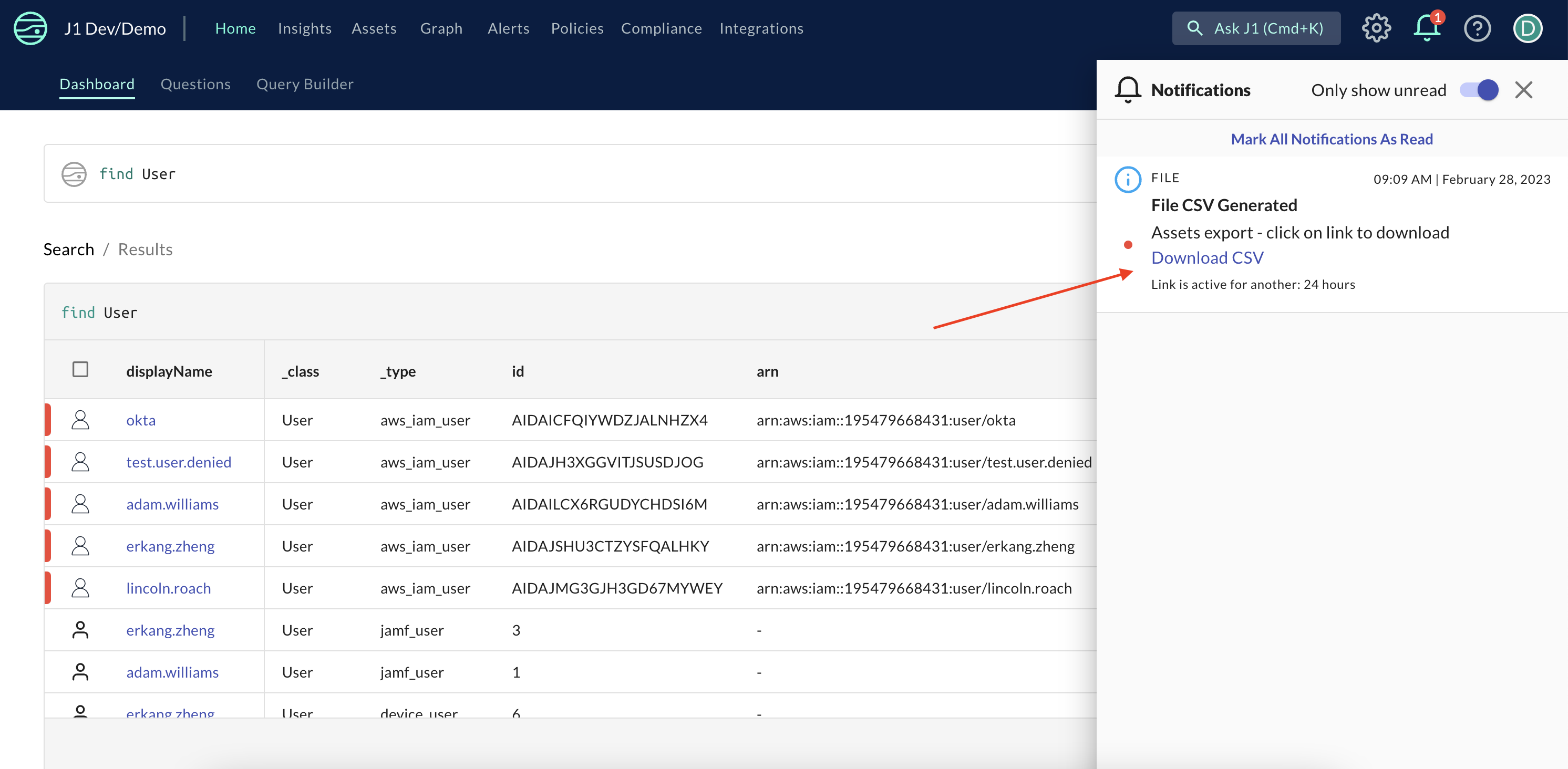
-
In J1 Compliance, you can now set compliance requirement applicability at the top level, giving you greater control over your compliance posture for your unique security needs. For requirements marked as not applicable, you can now provide the business justification with J1, saving time and providing clarity.
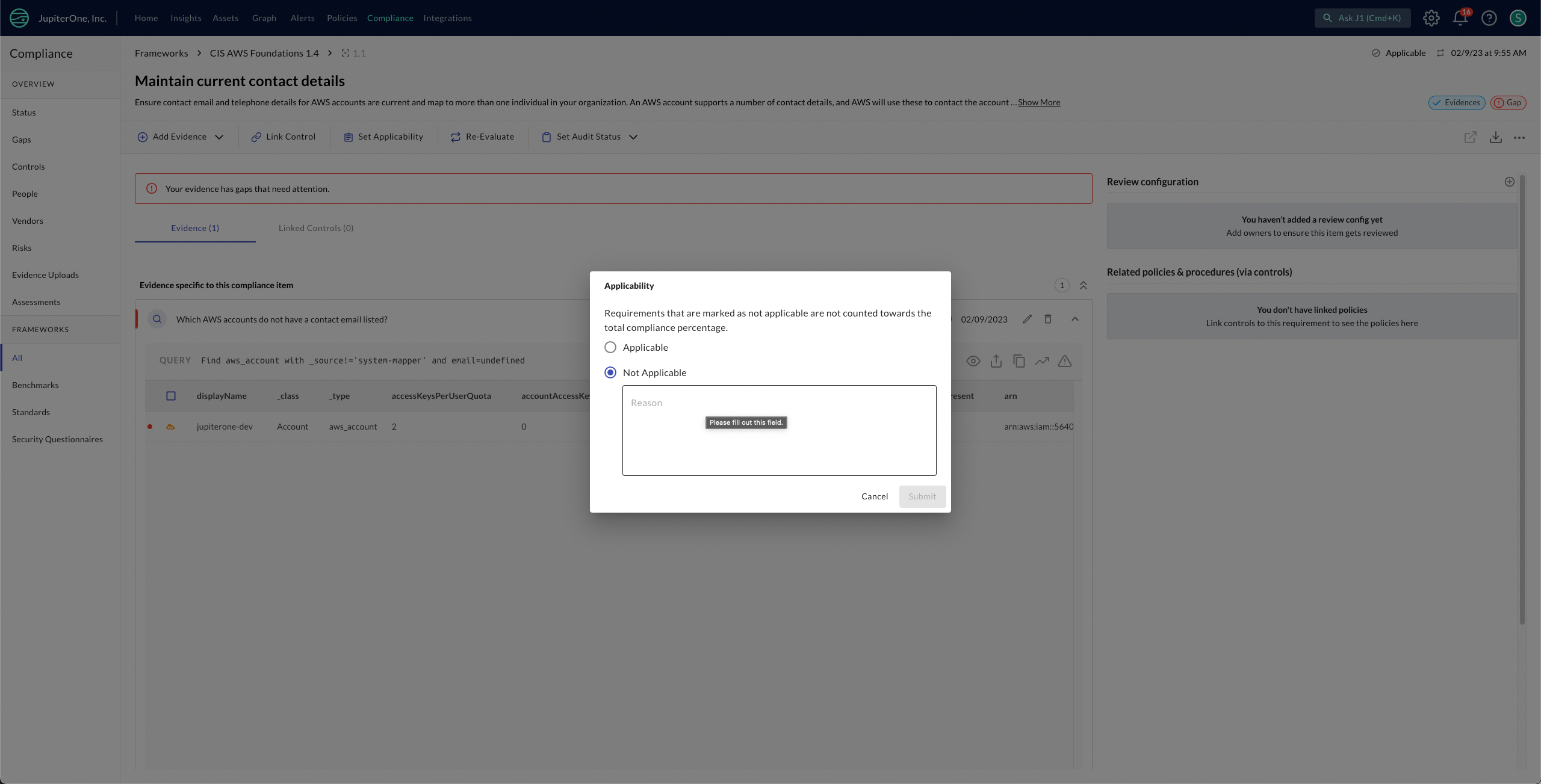
-
The alert trend in your Alerts modal is updated to provide detailed information on the status of the rule that powers the alert outcome. The trend shows when an alert was triggered, the result count, as well as when a rule failed to evaluate.

-
Your J1 Asset Inventory is now upgraded to be organized by asset category. This upgrade narrows down your inventory to get to what you need more quickly. This upgrade also comes with an increased focus on critical assets to help you monitor your most sensitive assets.
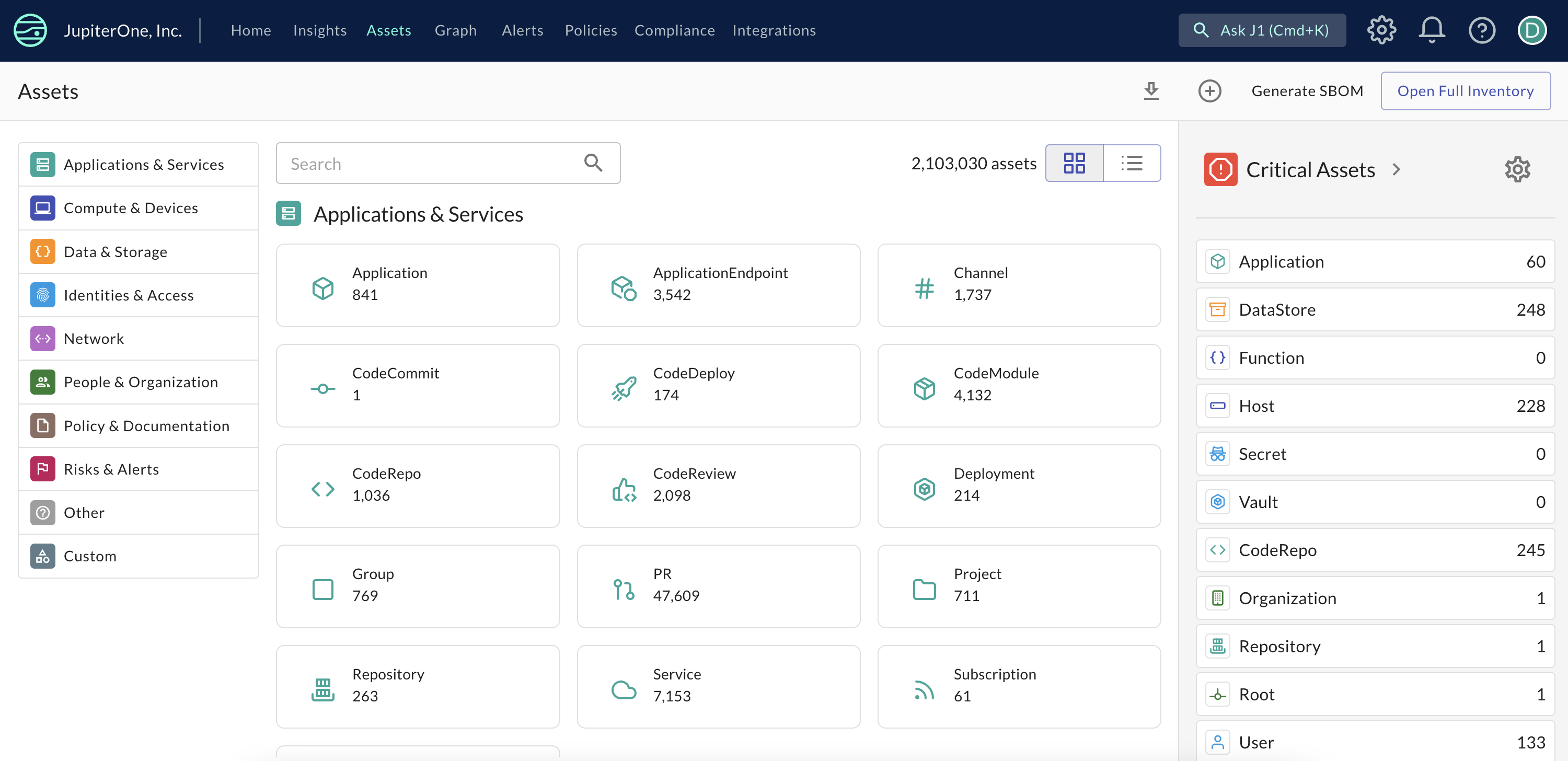
-
You can now customize you and your team's J1 Home experience with J1 Insights dashboards by publishing them to your users to pin as their default experience in J1.
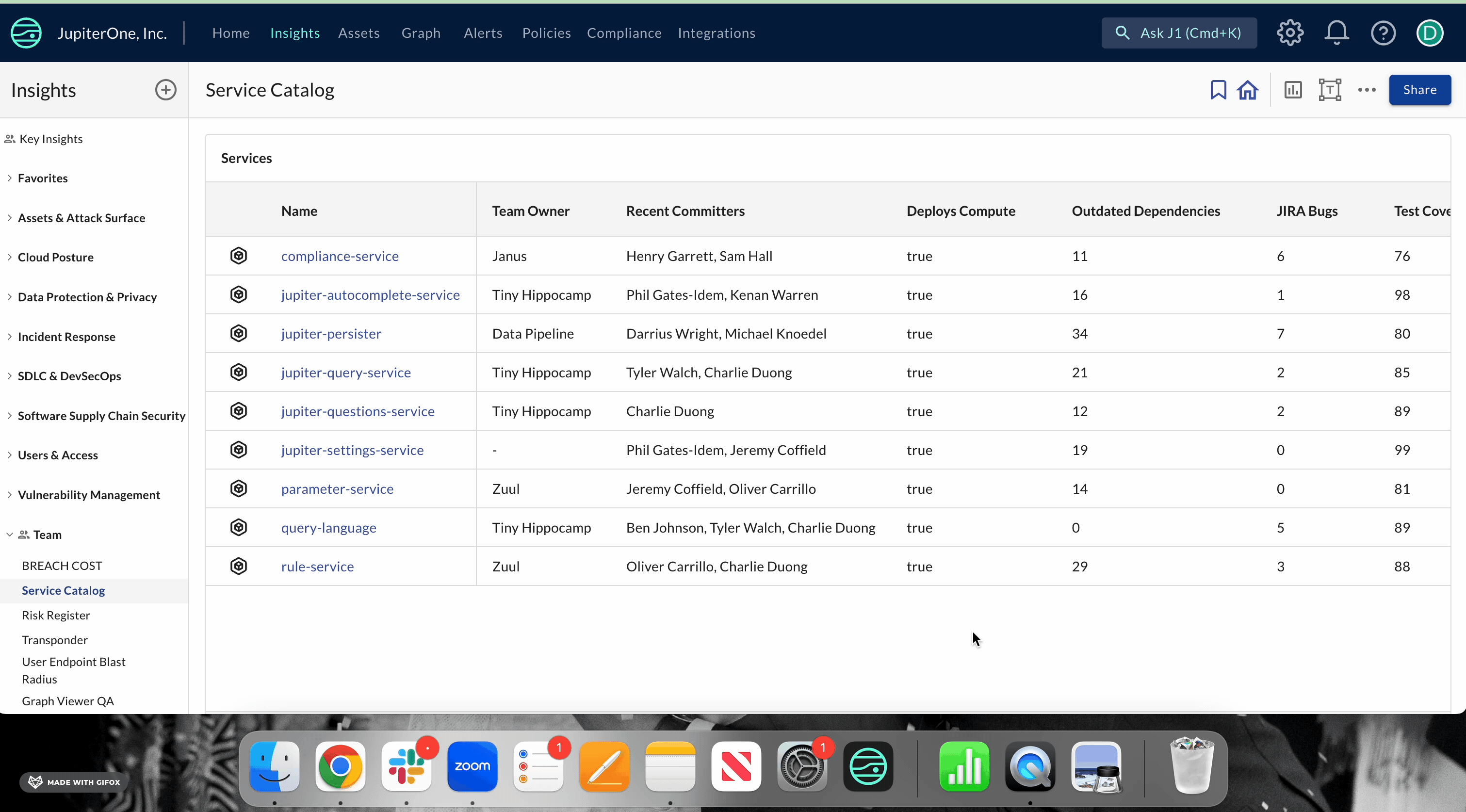
-
Your query results
csvdownload links now have date-specific filenames to help you organize your exports locally. -
Your
csvexports can now support multiple queries from Insights. -
Alerts with multiple queries in the Rules now display all queries that power the Alert, along with additional information about when an action was triggered and the results.
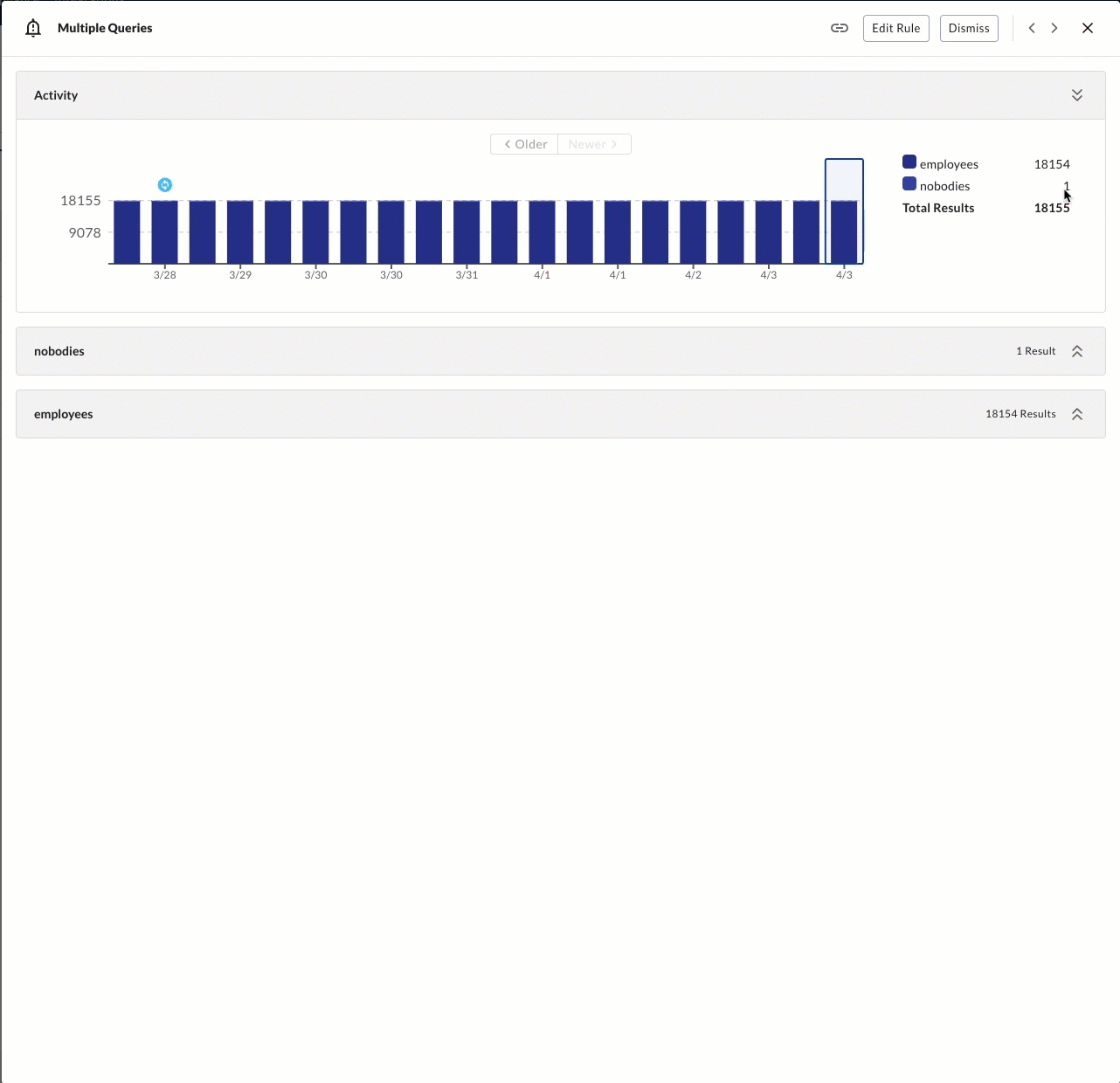
-
For organizations using Google as their Identity Provider, JupiterOne now pulls in the users Google profile picture into their J1 user account.
-
You can now assign users of J1 to be notified for certain Alert Rules, including yourself or others. This assigns ownership and allows you to set up Alert Rules that notify a single user (or the users assigned) when triggered, rather than everyone.
-
Your AWS integrations now display parent-child relationships, allowing you to see the high-level view of how instances relate to each other.
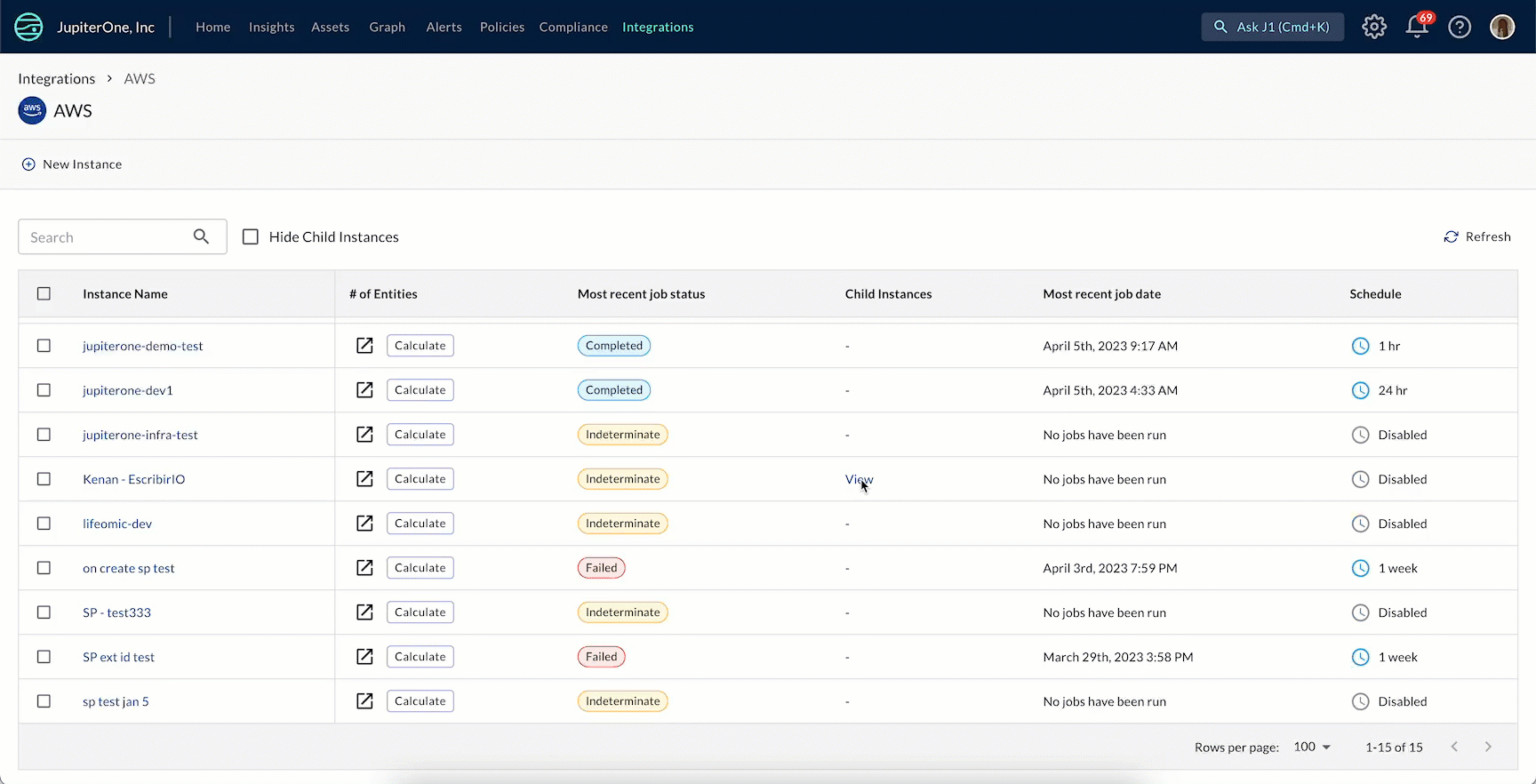
Integrations
- Updated Artifactory to include the relationship for
CodeRepo USES CodeModule. - For AWS ElastiCache, the following change was made:
aws_elasticache_cluster_node USES aws_eni.
AWS CodeBuild
-
Added the AWS CodeBuild integration with the following entities:
Source _typeEntity classAWS CodeBuild Service aws_codebuildServiceCodeBuild Project aws_codebuild_projectCodeRepoCodeBuild Report Group aws_codebuild_report_groupResource
AWS Inspector
-
Added the AWS Inspector V2 integration with the following entities:
Source _typeEntity classAWS Inspector v2 Service aws_inspectorv2ServiceInspector v2 Finding aws_inspectorv2_findingFinding
AWS Network Firewall Service
-
Added support for AWS Network Firewall Service with the following entities:
Source _typeEntity classAWS Network Firewall Service aws_networkfirewallService
AWS Shield Advance
-
Added support for additional entities for the AWS Shield Advance integration:
Source _typeEntity classAWS Shield Protection aws_shield_protectionFirewallAWS Shield Protection Group aws_shield_protection_groupResourceGroupAWS Shield Service aws_shieldServiceAWS Shield Subscription aws_shield_subscriptionSubscription
AWS Kinesis Data Stream
-
Added the AWS Kinesis Data Stream integration with the following entities:
Source _typeEntity classAWS Kinesis Service aws_kinesisServiceAWS Kinesis Stream aws_kinesis_streamData Collection,Queue
AWS Lex
-
AWS Lex now supports the following entities:
Source _typeEntity classAWS Lex V2 Bot aws_lexv2_botModelAWS Lex V2 Bot Alias aws_lexv2_bot_aliasModelAWS Lex V2 Service aws_lexv2Service
AWS Secrets Manager Service
-
Added support for the AWS Secrets Manager Service entity:
Source _typeEntity classAWS Secrets Manager Service aws_secretsmanagerService
AWS Config Recorder: AccessAnalyzer, AC, API Gateway, AutoScaling, and ELB, and ELBV2
-
Added services to AWS Config Recorder integration with the following entities:
Source _typeEntity classConfigservice Rule aws_config_ruleControlPolicyConfigservice Service aws_configServiceAWS AccessAnalyzer Service aws_accessanalyzerServiceAccessAnalyzer Analyzer aws_accessanalyzer_analyzerAssessment,ScannerAccessAnalyzer Finding aws_accessanalyzer_findingFindingAWS ACM Service aws_acmServiceAWS Autoscaling Service aws_autoscalingServiceAutoscaling Group aws_autoscaling_groupDeployment,GroupAutoscaling Launch Configuration `aws_autoscaling_launch_configuration ConfigurationAutoscaling Policy aws_autoscaling_policyConfigurationELB Application Load Balancer aws_albGatewayELB Gateway Load Balancer aws_elbGatewayELB Network Load Balancer aws_nlbGatewayAWS ApiGateway Service aws_apigatewayService
BigID
-
Added a new integration for BigID.
-
The following entities are created:
Resources Entity _typeEntity _classAccount bigid_accountAccountData Source bigid_datasourceDataCollectionPII Object bigid_pii_objectRecordUser bigid_userUser -
The following relationships are created:
Source Entity _typeRelationship _classTarget Entity _typebigid_accountHAS bigid_userbigid_accountSCANS bigid_datasourcebigid_datasourceHAS bigid_pii_object -
The follwing mapped relationships are created:
Source Entity _typeRelationship _classTarget Entity _typeDirection bigid_accountHAS aws_s3_bucket FORWARD
Device42
-
Added a new integration for Device42.
-
The following entities are created:
Resources Entity _typeEntity _classAccount device42_accountAccountDevice device42_deviceDeviceEnd User device42_enduserUser -
The following relationships are created:
Source Entity _typeRelationship _classTarget Entity _typedevice42_accountHAS device42_devicedevice42_accountHAS device42_enduser
Polymer
-
Added Polymer integration with the following entities:
Source _typeEntity classAccount polymer_accountAccountRule polymer_ruleRuleViolation polymer_violationFinding
XM Cyber
-
Added XM Cyber integration with the following entities:
Source _typeEntity classEntity xmcyber_entityRecord
Bug Fixes
- Deleted entities, if turned on, can be included in csv downloads after a recent download bug fix.
- An issue in the J1 Insights navigation for reordering dashboards is resolved.
- Insights PDF downloads received a fix to the download timeouts issue.
- Problems with the Gaps view in J1 Compliance not loading are resolved.
- Query table datetime formatting issues with
stringsreceived a fix. - A problem with removed frameworks still sending review emails is resolved.
- Errors for
pngandpdfdownloads in Insights have been resolved. - Errors for
csvdownloads have been resolved. - Issues with downloading evidence for specific requirements in J1 Compliance have been fixed.
- A problem with the Alert Modal indefinitely loading due to query size has been resolved.
Coming Soon
- Introducing: Asset Categories! J1 is reworking how assets are categorized, based on industry standards. These categorizes will persist throughout J1 to make searching and finding, the right information easier.
- The home experience will become more flexible for your user groups by allowing you as an admin to publish J1 Insights dashboards to you and your user groups landing experience.
- AWS Config Recorder will soon be a fully supported and generally available service to all J1 users via the J1 Integrations section of the platform.
- Alert rules will soon alert on new results only, reducing duplicates from queries and cutting through the noise to highlight what is important and what needs your attention.
- New trend chart visualizations are coming to Insights to help you and your teams answer key questions of your assets over time within the dashboarding experience.
- You will soon be able to set alert rules at a user- level, meaning that you can set alerts up for yourself or for other users.
- J1 Insights chart creation is about to get a whole lot easier with the introduction of chart previews as you write your queries in Insights.
- The settings experience is getting a refresh that includes an updated look-and-feel, and new user management options that make searching for users, groups, and their permissions much easier.
Product Notice
- As of April 15th, 2023, the JupiterOne Endpoint Compliance Agent powered by Stethoscope will be removed from the product and will no longer be supported by JupiterOne.